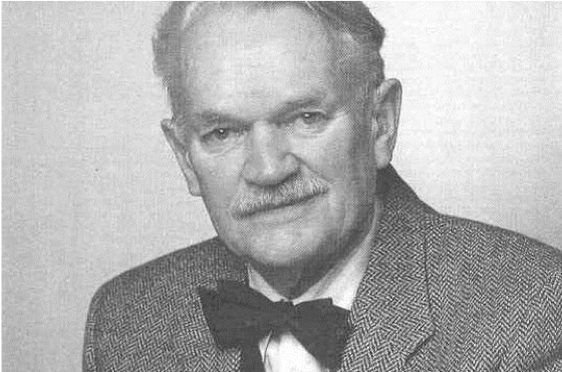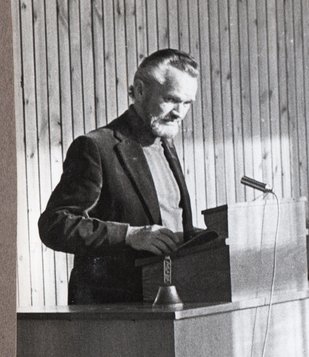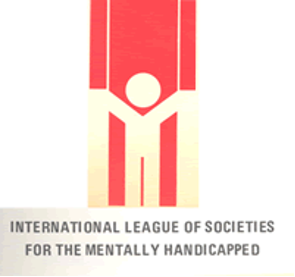Niels Erik Bank-Mikkelsen (1919-1990)
Niels Erik Bank-Mikkelsen was a Danish policy reformer and advocate for the rights of persons with intellectual disabilities. Working for the so-called ‘Danish Service for the Mentally Retarded’ (Statens åndssvageforsorg), a public organisation for the care of intellectually or developmentally disabled people, he was instrumental in developing key legislation that granted the intellectually disabled a right to the same living conditions as other citizens. This was seen as a radical move at a time when marginalization and segregation were the norm, and his ideas quickly gained ground both in Denmark and internationally.

Niels Erik Bank-Mikkelsen was born in the west-Danish town of Skjern in 1919. During the Nazi occupation of Denmark in World War II he was a member of the Danish resistance movement, publishing underground newspapers while pursuing a law degree at the University of Copenhagen, which he completed in 1944. Later that year he was exposed to the Gestapo and spent time in a Nazi concentration camp. After returning to Copenhagen at the end of the war, he started working for the Danish Ministry for Social Affairs and in 1950 moved to what was then called the Danish Service for the Mentally Retarded (the Service - Statens åndssvageforsorg).
Public disability care and the desire for reform
At the Service, Bank-Mikkelsen’s obligations included regular inspection visits to the eleven state-run special institutions for people with mental and intellectual disabilities spread across the country. Shocked at the sight of the often dire and overcrowded living conditions that left little room for individual needs, personal development or education, and reminded of his imprisonment in a concentration camp, Bank-Mikkelsen decided to dedicate his career entirely to the reform of public disability care. With the support of a parent organization for children with intellectual disabilities he began advocating for smaller housing units, opportunities for education and vocational training, leisure activities and integration into the local community.

PICTURE: "Father of the Normalization Principle", Niels Erik Bank-Mikkelsen traveled and spoke widely, both in Denmark and internationally. Photo: Henning Jahn.
His promotion to departmental head of the Service in 1959 gave him responsibility for the entire care sector for people with intellectual and mental disabilities in Denmark, and thus the authority to put his ideas into practice. Already in the same year he drafted the Mental Retardation Act (åndssvageloven), which was to become the cornerstone of his campaigns.
Although the historical terminology seems stigmatizing and demeaning from a modern perspective, it should not blind us to the content of this key legislation. Later coined the ‘principle of normalization’, the central idea behind Bank-Mikkelsen’s seminal law was that persons with intellectual disabilities had a right to the same daily routines and living conditions as their non-disabled peers and "an existence as close to normal as possible".
“an existence as close to normal as possible”
One result was the establishment of eleven regional disability care centers comprised of a main institution and several smaller ones, including group homes. Resident doctors, previously endowed with almost absolute authority, had to share their responsibility with a board consisting of economic, social, medical and education professionals, and a new institute for further education was established for disability care employees.

PICTURE: Children at 'Andersvænge', a former institution for persons with mental and intellectual disabilities. Opened in 1940, the design of 'Andersvænge' followed contemporary ideas of special pedagogy and vocational rehabilitation and was considered a ‘model institution’. Photos: Dansk Forsorgshistorisk Museum
International advocacy for the rights of intellectually disabled persons
During the 1960s and 1970s Bank-Mikkelsen also gained importance in the international promotion of the rights of intellectually disabled persons. His ideas were introduced to countries like Norway, Sweden, Canada and the United States, albeit in slightly modified forms. In 1962 he welcomed an advisory committee from the United States that was sent by president Kennedy to study the Danish system of disability care, beginning a long-term professional exchange between the countries. Two years later, he co-founded the International Association for the Scientific Study of Mental Deficiency, and he regularly gave talks at congresses or conducted international study trips, where he visited disability facilities and met with political representatives and parent organizations. In recognition of his dedication, Bank-Mikkelsen received the 1968 Kennedy Foundation Award.

Of particular significance was his keynote speech at a symposium of the International League of Societies for the Mentally Handicapped in Stockholm on Legal Aspects of Mental Retardation as it provided the ground for the so-called Jerusalem Declaration passed by the League in 1968. Titled From Charity to Rights, it committed to the equal rights of persons with intellectual disabilities and their personal self-determination, and had a great influence on the United Nations Declaration on Human Rights of Mentally Retarded Persons from 1971.
Photo: Niels played an important role Legal Aspects of Mental Retardation symposium in 1967 which was sponsored by ILSMH. Permission to use logo given 07-12-2020 by Minnesota’s Governor Council on Developmental Disabilities.
Continued career and legacy
Bank-Mikkelsen returned his main focus to Denmark after becoming director of the Department of Care and Rehabilitation of the Handicapped under the National Board of Social Welfare in 1971. When a new law in 1980 transferred all public services and care for people with intellectual disabilities to the level of counties and municipalities, he left public administration in favor of working for the Central Disability Council (Det Centrale Handicapråd), a government-funded organization that still guides and advises the government and political bodies on disability-related issues. He passed away in 1990.
Bank-Mikkelsen retains an important position as the engineer of the Danish Mental Retardation Act and the so-called ‘father of the normalization principle’. While critical voices accuse him of having focused too much on the bureaucratic reorganization of care structures instead of increasing opportunities for people with intellectual disabilities to participate in society, his pioneering role in addressing the neglected situation and needs of this group at a time when the segregation of disabled people in mass institutions was widespread is undeniable.
Further reading:
- Birgit Kirkebæk, Normaliseringens periode. Dansk åndssvageforsorg 1940-1970 med særligt fokus på forsorgschef N.E. Bank-Mikkelsen og udviklingen af Statens Åndssvageforsorg 1959-1970 [The period of normalization. Danish mental disability care 1940-1970 with special focus on disability care manager N.E. Bank-Mikkelsen and the development of the Danish National Service for the Mentally Retarded 1959-1970] (Holte: Forlaget SocPol, 2001).
- Haruki Hanamura, Niels Erik Bank-Mikkelsen: Father of the Normalization Principle (Bogense: Niels Erik Bank-Mikkelsen Memorial Foundation, 1998).
- Niels E. Bank-Mikkelsen, Normalization: Letting the Mentally Retarded Obtain an Existence as Close to Normal as Possible (Washington, DC: President’s Committee on Mental Retardation, 1969).
- Robert John Flynn and Raymond A. Lemay, eds, A Quarter–Century of Normalization and Social Role Valorization: Evolution and Impact (Ottawa: University of Ottawa Press, 1999).
Links:
- Pamela Block: Niels Erik Bank-Mikkelsen. (Chicago: Encyclopædia Britannica, March 25, 2020).
- Birgit Kirkebæk, ed., Handicaphistorisk Tidsskrift 16: Normaliseringsideologien 50 år efter dens fremsættelse [Journal of Disability History 16: The ideology of normalization 50 years after its introduction] (Copenhagen: Historisk Selskab for Handicap og Samfund; Psykologisk Forlag A/S, October 2006).